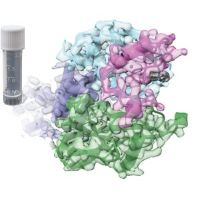Specification
| Description | Recombinant protein from the full-length sequence of Homo sapiens IL2 inducible T cell kinase (ITK) (NM_005546). |
| Organism | Homo sapiens (Human) |
| Expression Host | Human Cells |
| Tag Info | His or DYKDDDDK. Please contact us if you need further information or require specific designed tag. |
| Purity | Greater than 90% by SDS-PAGE gel |
| Uniprot ID | Q08881 |
| Entry Name | ITK_HUMAN |
| Gene Names | ITK EMT LYK |
| Alternative Gene Names | EMT LYK |
| Alternative Protein Names | Tyrosine-protein kinase ITK/TSK (EC 2.7.10.2) (Interleukin-2-inducible T-cell kinase) (IL-2-inducible T-cell kinase) (Kinase EMT) (T-cell-specific kinase) (Tyrosine-protein kinase Lyk) |
| Application | Antigens, Western, ELISA and other in vitro binding or in vivo functional assays, and protein-protein interaction studies; For research & development use only! |
| Buffer | Purified protein formulated in a sterile solution of PBS buffer, pH7.2, without any preservatives |
| Endotoxin | Endotoxin level is < 0.1 ng/µg of protein (<1EU /µg) |
| Length | 620 |
| Molecular Weight(Da) | 71831 |
| Protein Sequence | (The sequence of expressed protein may have some variation from the sequence shown below. Please contact us for the exact sequence.) MNNFILLEEQLIKKSQQKRRTSPSNFKVRFFVLTKASLAYFEDRHGKKRTLKGSIELSRIKCVEIVKSDISIPCHYKYPFQVVHDNYLLYVFAPDRESRQRWVLALKEETRNNNSLVPKYHPNFWMDGKWRCCSQLEKLATGCAQYDPTKNASKKPLPPTPEDNRRPLWEPEETVVIALYDYQTNDPQELALRRNEEYCLLDSSEIHWWRVQDRNGHEGYVPSSYLVEKSPNNLETYEWYNKSISRDKAEKLLLDTGKEGAFMVRDSRTAGTYTVSVFTKAVVSENNPCIKHYHIKETNDNPKRYYVAEKYVFDSIPLLINYHQHNGGGLVTRLRYPVCFGRQKAPVTAGLRYGKWVIDPSELTFVQEIGSGQFGLVHLGYWLNKDKVAIKTIREGAMSEEDFIEEAEVMMKLSHPKLVQLYGVCLEQAPICLVFEFMEHGCLSDYLRTQRGLFAAETLLGMCLDVCEGMAYLEEACVIHRDLAARNCLVGENQVIKVSDFGMTRFVLDDQYTSSTGTKFPVKWASPEVFSFSRYSSKSDVWSFGVLMWEVFSEGKIPYENRSNSEVVEDISTGFRLYKPRLASTHVYQIMNHCWKERPEDRPAFSRLLRQLAEIAESGL |
Background
| Function | FUNCTION: Tyrosine kinase that plays an essential role in regulation of the adaptive immune response. Regulates the development, function and differentiation of conventional T-cells and nonconventional NKT-cells. When antigen presenting cells (APC) activate T-cell receptor (TCR), a series of phosphorylation lead to the recruitment of ITK to the cell membrane, in the vicinity of the stimulated TCR receptor, where it is phosphorylated by LCK. Phosphorylation leads to ITK autophosphorylation and full activation. Once activated, phosphorylates PLCG1, leading to the activation of this lipase and subsequent cleavage of its substrates. In turn, the endoplasmic reticulum releases calcium in the cytoplasm and the nuclear activator of activated T-cells (NFAT) translocates into the nucleus to perform its transcriptional duty. Phosphorylates 2 essential adapter proteins: the linker for activation of T-cells/LAT protein and LCP2. Then, a large number of signaling molecules such as VAV1 are recruited and ultimately lead to lymphokine production, T-cell proliferation and differentiation (PubMed:12186560, PubMed:12682224, PubMed:21725281). Required for TCR-mediated calcium response in gamma-delta T-cells, may also be involved in the modulation of the transcriptomic signature in the Vgamma2-positive subset of immature gamma-delta T-cells (By similarity). Phosphorylates TBX21 at 'Tyr-530' and mediates its interaction with GATA3 (By similarity). {ECO:0000250|UniProtKB:Q03526, ECO:0000269|PubMed:12186560, ECO:0000269|PubMed:12682224, ECO:0000269|PubMed:21725281}. |
| Pathway | |
| Protein Families | Protein kinase superfamily, Tyr protein kinase family, TEC subfamily |
| Tissue Specificity | T-cell lines and natural killer cell lines. |
QC Data
| Note | Please contact us for QC Data |
| Product Image (Reference Only) |  |

